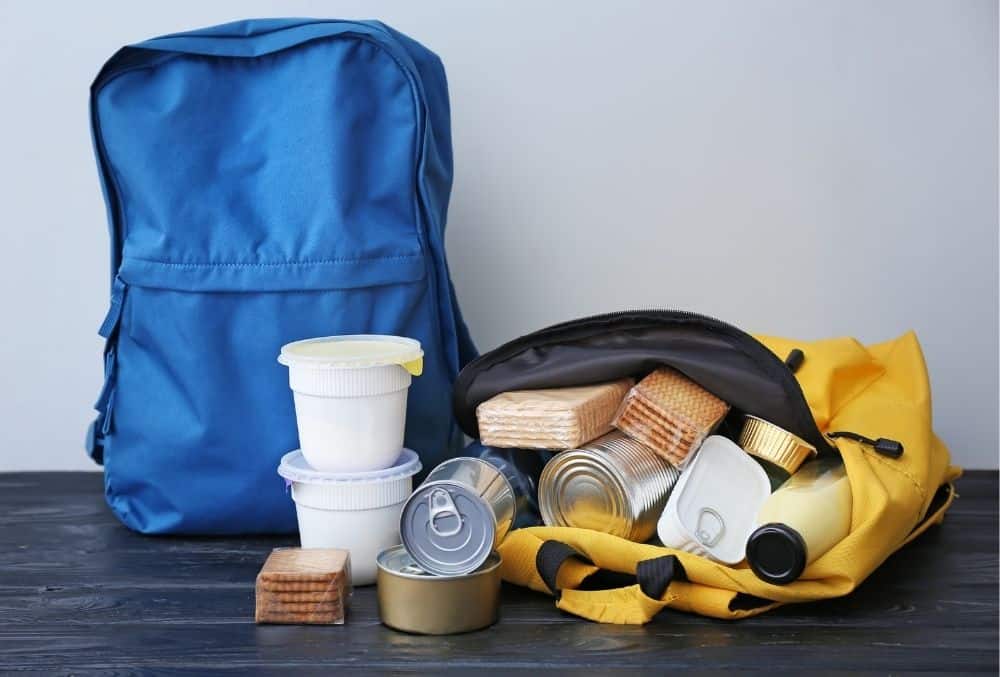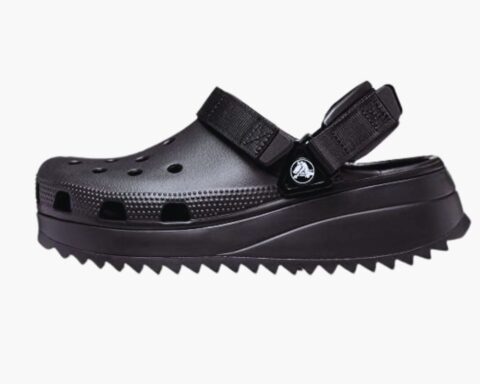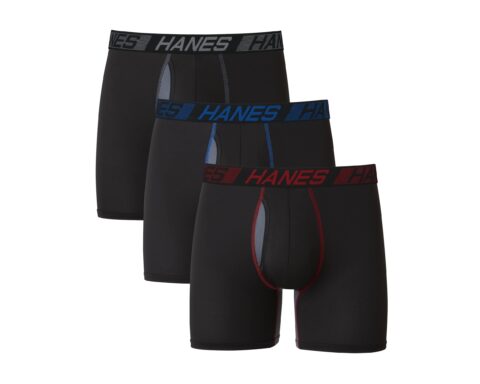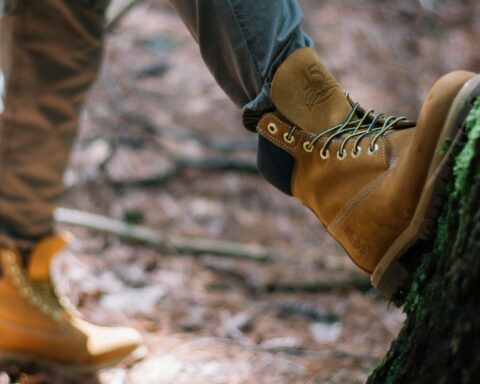When you are planning an overnight hike, you will need to consider what foods you are going to take with you.
We are here to provide some food suggestions and to highlight some of the factors you will need to think about when picking out food. Hopefully, our suggestions will make your hiking experience considerably smoother.
What’s Your Plan?
First things first, when you are planning the food that you will need for your trip, there are a few planning factors that will help you work out the quantities.
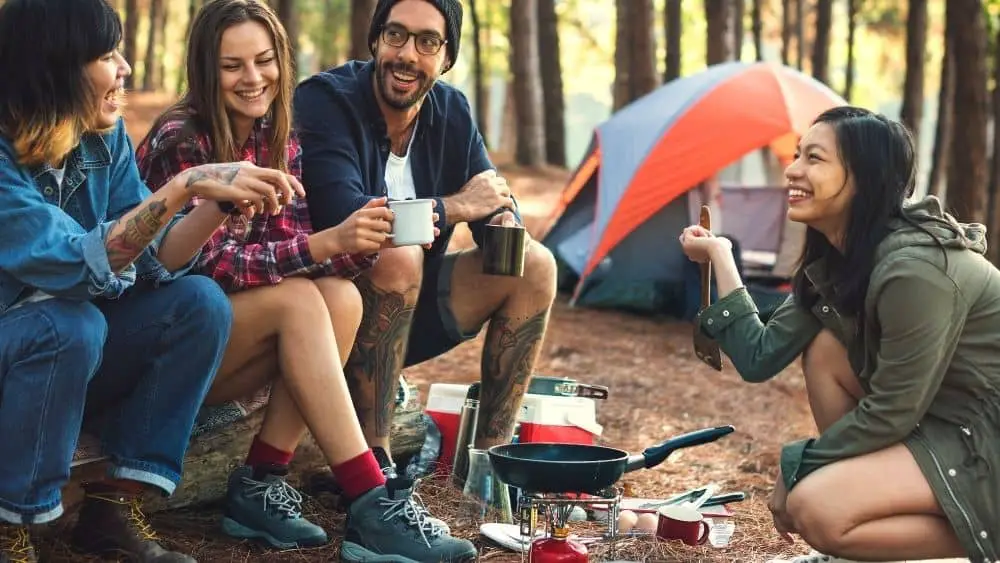
Plan your food around these factors:
- The length of the trip – are you just hiking out, camping overnight, and then hiking back? Or are you planning on undertaking a longer, multi-day hike?
- How you are planning to eat and drink – i.e., will you cook food, or are you relying on preprepared meals eaten cold.
- Are you able to take a cooler with you? This is essential if you are wanting to take any fresh produce with you, such as meat or dairy, but is also quite impractical, as it adds a lot of weight and bulk to your pack. Only consider taking a cooler (and therefore fresh food) if your hike out is pretty short.
- What tools you will need for your meals i.e., cutlery and plates are a must, but will you need a little camp stove and cooking utensils too?
What Food Should I Bring For A Shorter Hike?
If you are planning on only going on a shorter overnight hike – for example, you hike out in the afternoon, set up camp, stay overnight, and then hike back in the morning, then you can probably take mainly perishable items for the first day, such as sandwiches or preprepared pasta.
After that (i.e., breakfast and snacks for the second day), you will have to map out a lot of your meals, using shelf-stable, non-perishable, and easily packed basic items.
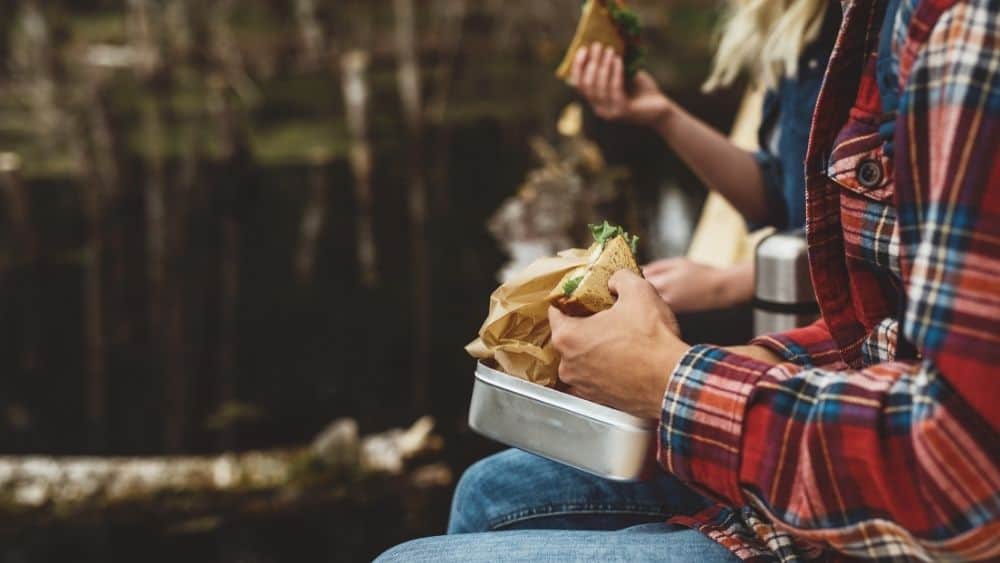
If you do decide to take perishables with you, you will need to take some kind of cooling device to keep them fresh. We recommend you take an ice pack, that has been cooled to below 40 degrees Fahrenheit.
Opt for food that is lightweight both and nutrient-dense, like:
- Trail mix (a hiking staple!)
- Nuts, seeds, nut-based bars, or packets of nut butter (which are rich in important carbs and fats, to fuel you throughout your hike).
- Fresh fruit that doesn’t require being chilled, like apples, oranges, or bananas.
- Dried, or freeze-dried fruit and vegetables.
- Energy bars, chews, or gels, to keep your energy levels up without taking too much room up in your pack.
- Granola, or granola bars, for a quick snack.
- Whole grain bread, or tortillas.
- Stable protein, such as jerky (which can be made out of meat, poultry, or fish).
- Bottled water (and maybe a few powdered beverages).
What Should I Bring On A Longer Hike?
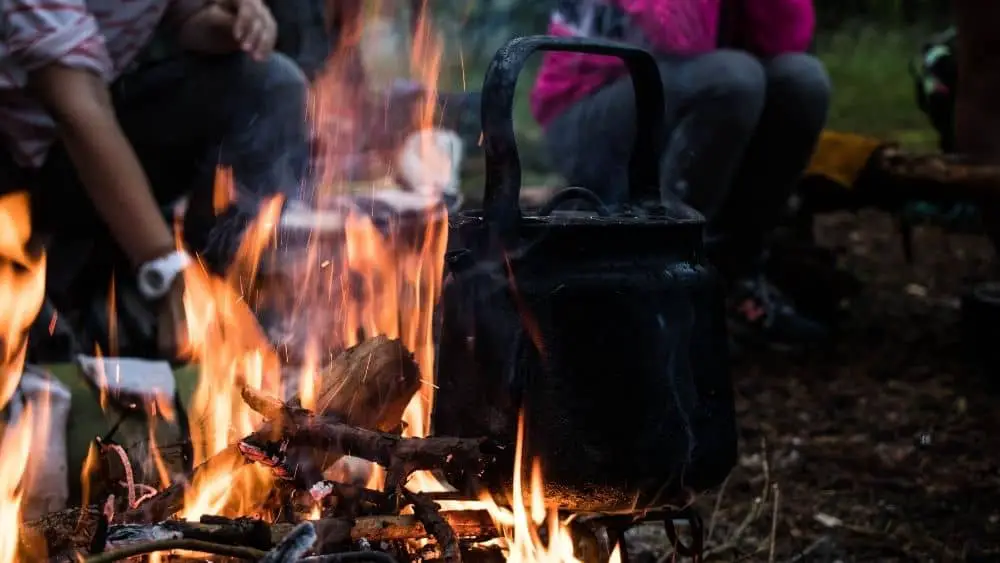
For your shelf-stable items, we recommend things such as:
- Ready to eat cereal and UHT milk
- Fruit or vegetable purée in lightweight, squeezable pouches, like applesauce, or baby food.
- Preserved protein – such as pouches, of poultry or fish, or canned meat/fish in individual servings.
- Individual pouches of condiments/sauces, like the ones often found in diners and fast-food restaurants. These can add some much-needed flavor to your camping food.
- If you have the ability to boil drinkable water, then you can take a lot of dehydrated grains and cereals to eat. You can make pasta, couscous, rice, easy pancake mix, oats, dried soups, or any other dehydrated food that you fancy.
- Marshmallows are a must, for the classic camper’s dessert treat.
- Bottled water (which is an absolute must, both for drinking and food prep), and possibly powdered beverage mixes.
What Are The Best Foods For Overnight Hiking?
Fruit
Fruits contain lots of vitamins and minerals, making them an essential food to bring.
Though all fruits will be great, dried fruits will be particularly desirable. They will have a longer shelf life than fresh fruits, meaning that you do not need to worry about using dried fruits quickly.
Moreover, dried fruits remain very portable, since they will not take up a lot of space in your bag. Dried raisins and mangoes are quite popular options. Dried mangoes are rich in vitamins A and C.
Nuts
Nuts are a great option since they will not take up a lot of room. Plus, nuts are quite healthy whilst also being tasty. Nuts are high in lots of essential nutrients, such as fiber, protein, magnesium, and vitamin E.
This will give you energy, thus helping you on your hike. Of course, the exact nutrition of a nut will depend on what type of nut you choose. Cashews, peanuts, and almonds will be particularly great for hiking.
Beans
Next, beans are great for hikers who are looking to increase their fiber and protein intake.
Beans tend to have long use-by dates, meaning that you can keep them in the bottom of your bag and use them whenever you need to. These beans are great for adding to meals or they can be eaten on their own.
Dehydrated Foods
Though dehydrated food may not be the most pleasant, it will be essential for hikers. These meals can normally be heated up and consumed for added warmth.
These foods can be found in hiking shops. There should be a wide range of products available, enabling you to find the meal that most appeals to you.
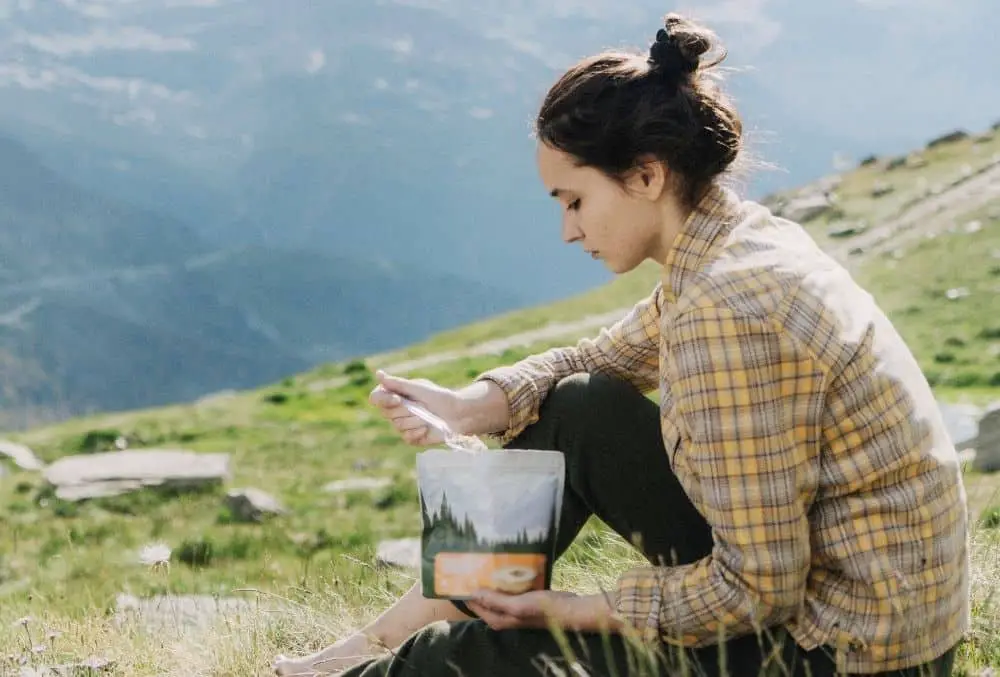
Oatmeal
If healthy eating is a priority for you, you cannot go wrong with oatmeal.
Oatmeal is super healthy and convenient to make. This results in it being a must-have for hikers. You can also add other foods, such as fruits, to the oatmeal to make it more substantial and flavorsome.
Protein Bars
Protein is great for exercising. It can be an amazing source of energy. Plus, protein can be used to build muscles. Protein bars are an effective way of getting more protein into your diet.
As their names suggest, these bars are high in protein. There are lots of different protein bars available, meaning that you can choose whichever one suits your taste and diet.
Here is an incredible set of protein bars for you to try out.
Spices
Brining a packet of spices or flavoring may sound a little extra, but it can help to liven up your food. In addition, spices will not take up a lot of room in your bag, meaning that they are not taking up essential space.
For example, you may want to take garlic powder or paprika for savory dishes. Meanwhile, cinnamon can provide flavor for drinks or sweeter dishes.
Hot Drinks
When the weather is chilly, hot beverages can really revive you. Tea, coffee, or hot chocolate are great drinks to bring with you. Though water is essential, these hot drinks can be bought too.
You will only need a small amount of these beverages, meaning that they are quite portable. Plus, you can prepare them easily even when you are mid-hike. These drinks are certain to give you some energy in the morning.
What Meals Can I Make?
To help you plan some meals, here are some suggestions for what you can have at different times of the day. Most of these meals will involve the foods that we previously recommended.
Breakfast
- Coffee/ tea
- Cereal/ a cereal bar
- Oatmeal
- Nuts and dried fruit
Lunch
- Dehydrated meals
- Beans
- Soups
- Tuna
Dinner
- Dehydrated meals
- Pasta e.g. macaroni and cheese
- Rice
- Couscous
- Tuna
Snacks
- Nuts
- Fruit
- Protein bar
- Dried jerky
- Biscuits
- Marshmallows
Other Things You May Need
Maintaining food safety protocol is essential, especially when you are in the great outdoors, as food contamination is really easy whilst cooking outside.
You’ll need to maintain food safety practices from packing your food to plating it. To ensure food safety, there are a few things you need to bear in mind, and a few pieces of kit you will have to take with you.
You won’t be able to take perishable food unchilled if you are hiking in temperatures above 90 degrees Fahrenheit, for more than one hour, as it will spoil in the heat, and could make you ill. In milder weather, unchilled perishables will last a few hours, but should still be eaten in the first stages of your hike.
You will need food safety essentials too, such as:
- Disposable wipes, hand sanitizer, and biodegradable or wildlife friendly dish soap/hand soap.
- Lightweight bowls and plates.
- Camp kettle and cooking pots.
- Eating and cooking utensils.
- A can opener (if you are not just taking ring-pull cans).
- Ice packs, if you are planning on taking any fresh food.
- Trash bags (littering is a big no-no on hiking trails, and can get you big fines).
- Portable water filters or purification tablets, if you are planning on gathering water as you go.
- Thermometer for your ice packs, and for cooking any meat you take.
You also have to make sure that you strictly follow food hygiene protocols:
- Wash your hands frequently through your hike, including before and after you eat. If this isn’t a viable option, then you can use a hand sanitizer with at least 60% alcohol might help kill off any bacteria.
- Keep the raw meat and ready to eat foods separate (or even in different packs if possible). Use one of the plates that you have packed for raw meat and another one for prepared foods.
- Cook all of your food to the proper temperatures, and use a food thermometer so that you know all of your food (especially the meat) has reached a safe internal temperature.
- When you can, refrigerate your food to below 40 degrees Fahrenheit, though if it doesn’t seem feasible, make sure that you have nay perishables, especially peat, poultry, and fish poached with a lot of ice/ice packs, in a well-insulated cooler, so that they never go above 40 degrees Fahrenheit.
- Store any leftovers in small, sterile, covered containers only if the cooler still has ice in it – otherwise throw them out.
- If you are using a cooler, then keep it in as cool of a place as possible.
What Factors Do I Need to Consider?
When shopping for foods, please consider the following:
- Price – nobody will want to spend a fortune on their hiking supplies. Because of this, it is good to set aside a budget for your trip. Fortunately, a lot of our suggestions above are quite affordable foods.
- Portability – when you are hiking, added weight in your backpack will make the experience much more strenuous. Because of this, you will need to obtain foods that can easily fit into your bag. They should not be very heavy or take up much room, thus allowing you to fit all of the essential equipment in your bag. Foods should be portable, lightweight, and space-saving.
- Ease of preparation – when you are hiking, it will be impossible to bring the entire kitchen with you. Therefore, you should take into account how easy it will be to prepare food. You will need to contemplate what utensils you should bring with you. The utensils that you have access to will limit the foods you can make.
- Energy – food that will give you energy will be helpful. This food can propel you to continue your hike. Foods that leave you feeling tired and bloated should be avoided.
- Taste – let’s face it, nobody likes eating food that they find unappealing. Because of this, you should source foods that you consider to be tasty.
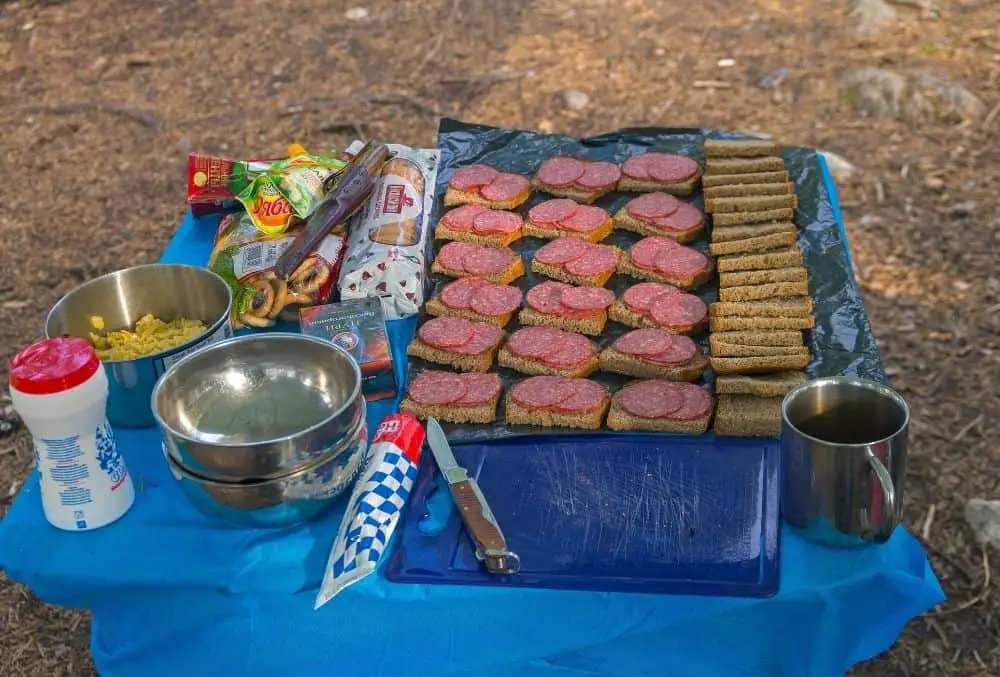
Top Tips
- Don’t be afraid to replace packaging. Food foods come in packets that are too big. Instead, transfer the food into zip-lock bags. This will save space in your bag and will enable you to portion your food.
- Remember to bring any leftover food or waste with you. Do not litter under any circumstances. If you have any food packaging, bring it with you and dispose of it when you see a bin. Remember to recycle any reusable packaging.
- Reward your hard work. After climbing, you should reward your strenuous work by eating food that you enjoy. For example, if you enjoy chocolate, you can bring a small piece with you to motivate yourself. While it is important to be healthy, it is okay to have a small amount of unhealthy food.
Frequently Asked Questions
How Many Calories Should I Eat Per Day?
The number of calories you should eat will depend on your gender and age.
Roughly, men are expected to consume more calories than women. Generally, it is recommended that women should have 2,000 calories per day and that men should aim for approximately 2,500.
If you are doing strenuous exercise, such as hiking, you may want to eat more calories. This will allow you to maintain any calories that you would burn. If you are trying to lose weight, do not do this.
How Should You Pack Food To Avoid Attracting Bears?
In some parts of the world, there is a danger of attracting bears when you are hiking. You can purchase bear-resistant food containers, such as this superb product.
- Protects your food and protects the bears
- Mandatory in many National Parks
- 716 cubic inches of storage
- Approved by the IGBC and the SIBBG
- Durable and easy to carry
Remember to clean any dishes that you have used. Some hiking sites may have specific rules for this, so be sure to check them out.
Final Thoughts
Hiking overnight can be a lot of fun. However, you need to prepare well to ensure that you do not go hungry. By following our suggestions, you should have plenty of options as to which foods you can take with you.
